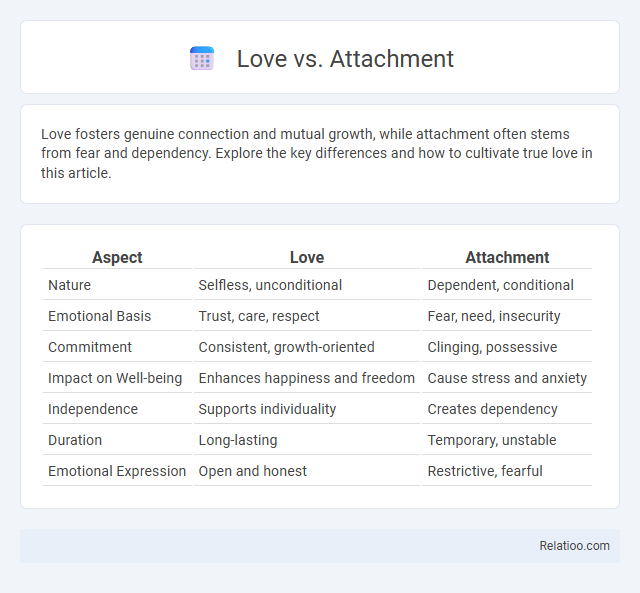Love fosters genuine connection and mutual growth, while attachment often stems from fear and dependency. Explore the key differences and how to cultivate true love in this article.
Table of Comparison
| Aspect | Love | Attachment |
|---|---|---|
| Nature | Selfless, unconditional | Dependent, conditional |
| Emotional Basis | Trust, care, respect | Fear, need, insecurity |
| Commitment | Consistent, growth-oriented | Clinging, possessive |
| Impact on Well-being | Enhances happiness and freedom | Cause stress and anxiety |
| Independence | Supports individuality | Creates dependency |
| Duration | Long-lasting | Temporary, unstable |
| Emotional Expression | Open and honest | Restrictive, fearful |
Understanding Love: A Deeper Connection
Understanding love involves distinguishing it from attachment, where love centers on genuine care and emotional support, while attachment often arises from dependency or fear of loss. True love fosters growth, empathy, and respect, creating a deeper connection that transcends physical or emotional needs. Your relationships thrive when you embrace love as an empowering force rather than a binding attachment.
What is Attachment? Exploring Its Roots
Attachment is a psychological and emotional bond formed between individuals, often rooted in early childhood experiences with primary caregivers. It manifests as a dependency that seeks security and comfort, differing from love by being more focused on possession and fear of loss. Understanding attachment patterns, such as secure, anxious, or avoidant, reveals its influence on adult relationships and emotional well-being.
Key Differences Between Love and Attachment
Love is a deep, selfless emotional connection focused on mutual growth and well-being, while attachment often stems from dependence and fear of loss. Your experience of love encourages freedom and trust, whereas attachment can lead to possessiveness and insecurity. Understanding these key differences helps nurture healthy relationships that prioritize genuine emotional bonds over control or neediness.
Signs You’re Experiencing Love
Signs you're experiencing love include a deep sense of care, emotional intimacy, and selfless concern for the well-being of another person. Genuine love fosters trust, respect, and a desire to support growth without dependency or control. Unlike attachment, love encourages freedom and acceptance rather than anxiety or possessiveness.
Signs You’re Experiencing Attachment
Signs You're Experiencing Attachment include a persistent need for validation from others, difficulty setting personal boundaries, and feeling anxious or insecure when separated from the object of your attachment. You may find yourself relying heavily on external factors for your emotional well-being rather than cultivating inner peace. Recognizing these patterns helps you differentiate attachment from healthy, unconditional love, which fosters mutual respect and emotional independence.
The Psychological Basis of Love and Attachment
The psychological basis of love involves deep emotional connection, characterized by intimacy, passion, and commitment, which fosters genuine care and empathy toward another person. Attachment, rooted in early childhood experiences, manifests as a bond seeking security and comfort, often driven by fear of loss or abandonment. Distinguishing love from attachment requires understanding that love promotes growth and mutual support, whereas attachment can sometimes lead to dependency and anxiety.
Impact on Relationships: Love vs Attachment
Love fosters trust, emotional intimacy, and long-term commitment, creating a stable foundation for healthy relationships, whereas attachment often stems from dependency and fear of loss, which can lead to insecurity and conflict. Attachment may cause individuals to prioritize their own needs over their partner's well-being, while love encourages mutual growth and support. Understanding the distinction between love's selfless nature and attachment's possessive tendencies is crucial for cultivating lasting, fulfilling relationships.
Healthy Relationships: Striking the Balance
Healthy relationships require distinguishing love from attachment, where love involves mutual respect, trust, and growth, while attachment may lead to dependency and insecurity. You cultivate balance by nurturing emotional intimacy without losing individuality, fostering connection without clinging. Prioritizing open communication and self-awareness supports lasting bonds based on genuine affection rather than possessiveness.
Overcoming Unhealthy Attachment Patterns
Overcoming unhealthy attachment patterns requires recognizing the difference between genuine love and attachment driven by fear or dependency. You can cultivate a healthy relationship by fostering emotional independence, setting clear boundaries, and practicing self-awareness to avoid codependency. Prioritizing authentic love involves nurturing mutual respect, trust, and emotional security rather than clinging to attachments rooted in insecurity or neediness.
Cultivating Genuine Love in Your Life
Cultivating genuine love involves distinguishing it from attachment, where love is unconditional, nurturing growth and emotional freedom rather than dependence or possessiveness. True love fosters empathy, trust, and selflessness, creating deep, meaningful connections that enhance well-being and personal development. Developing this authentic love requires mindful awareness, emotional intelligence, and consistent, compassionate actions toward oneself and others.

Infographic: Love vs Attachment
 relatioo.com
relatioo.com